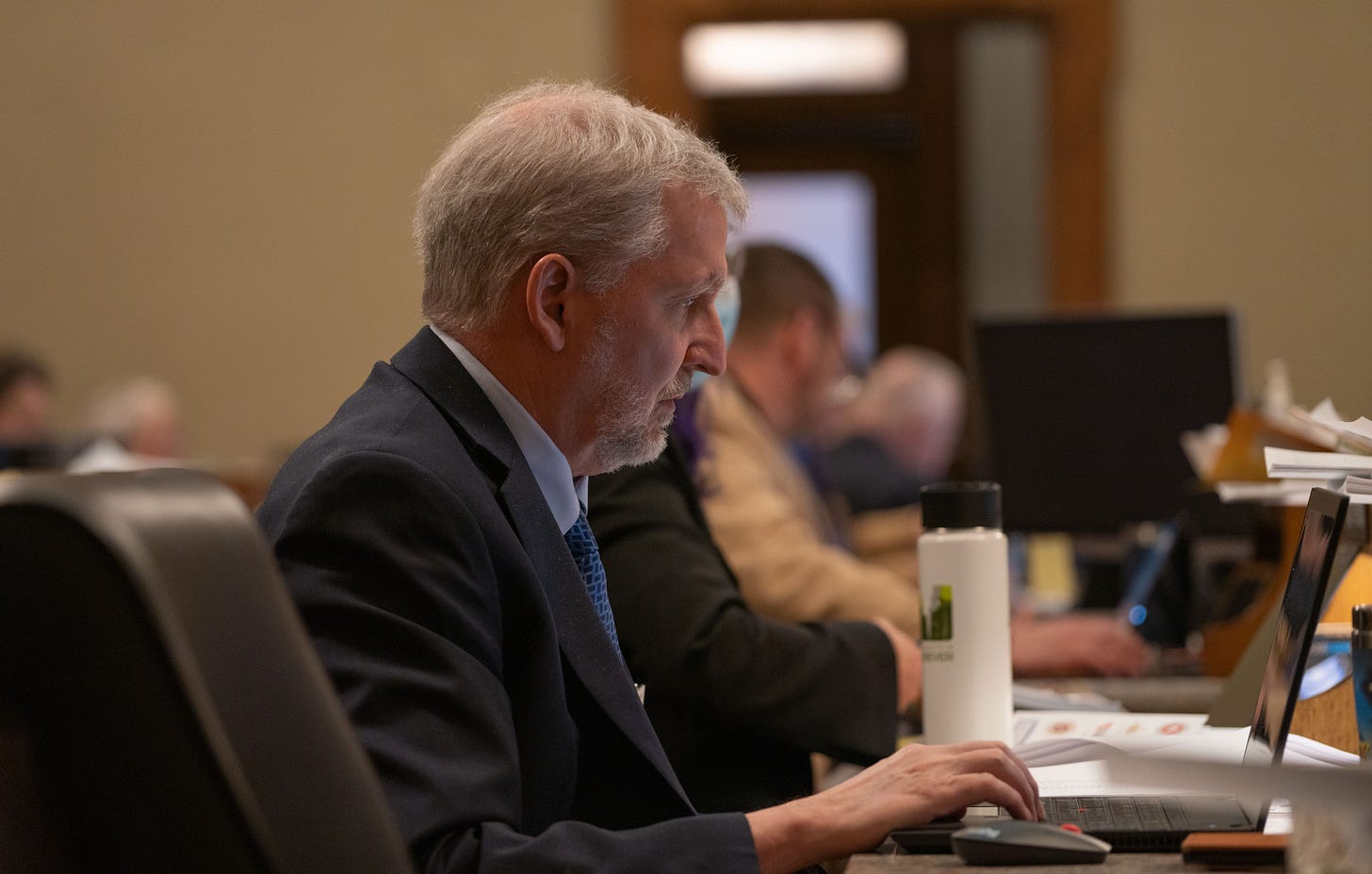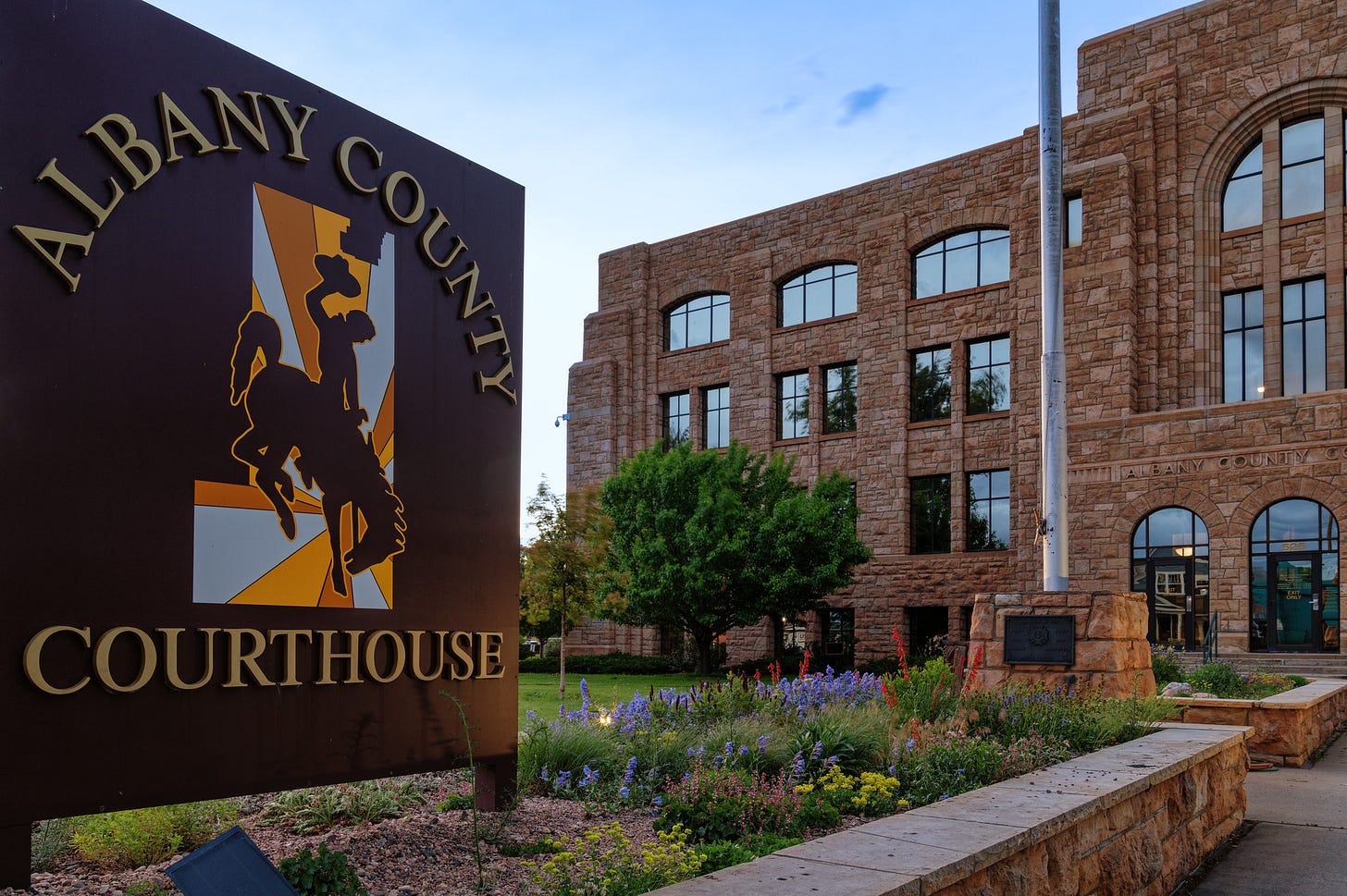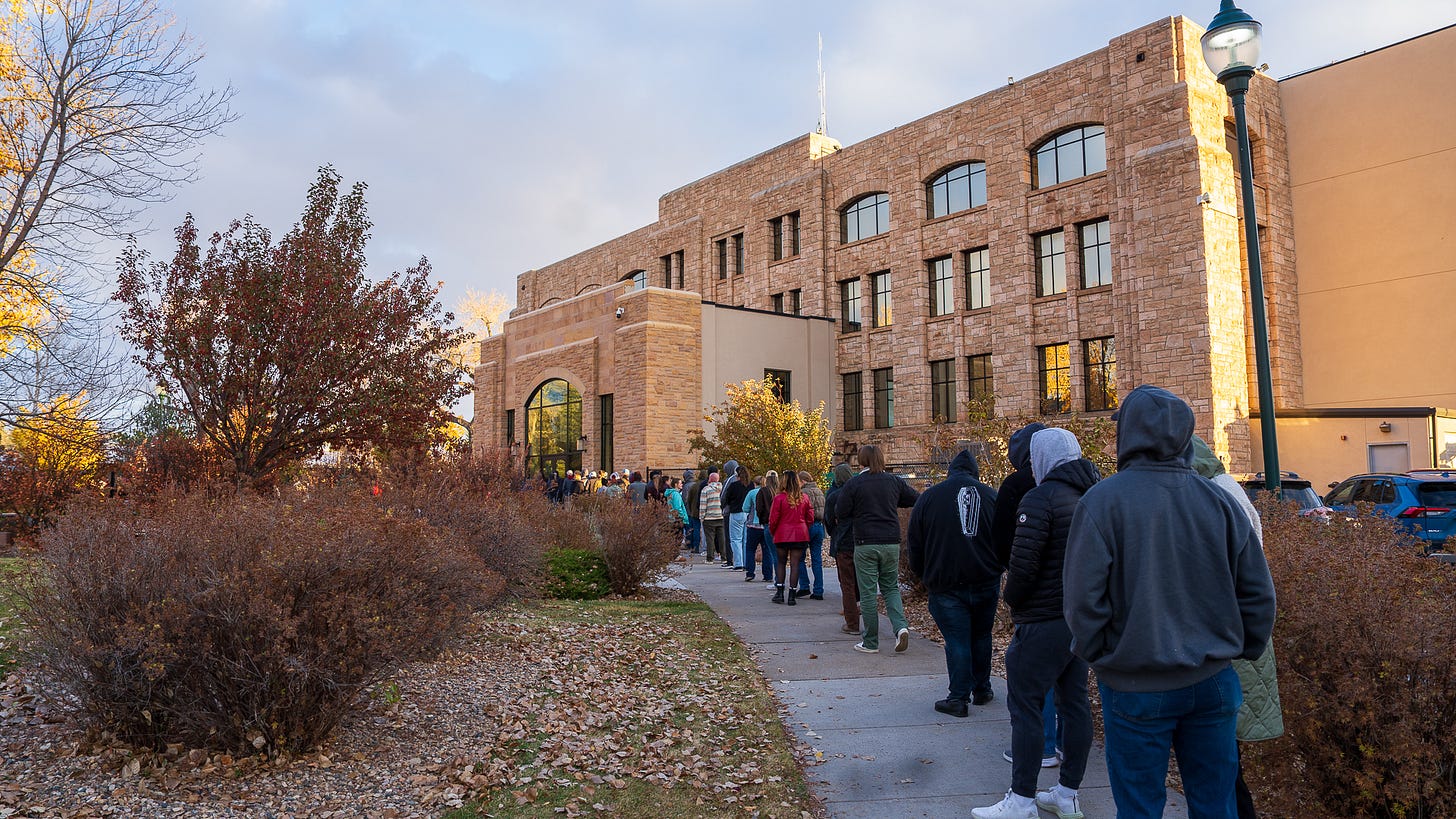Republican efforts to cry foul, question local election results, fall flat
A recount in House District 13 found identical results. Allegations of election improprieties were “false,” according to a police report that stopped just short of charging two prominent Republicans.
Various attempts by prominent local Republicans to question the security and results of the 2024 election have failed to turn up any improprieties — but they very nearly saw two members of Albany County Republican Party charged with election-related misdemeanors.
State Committeeman Mark Armstrong accused election staff of allowing Laramie Vice-Mayor Sharon Cumbie to be alone and unsupervised with unsecured absentee ballots while both Armstrong and Cumbie were serving as primary election judges.
A subsequent investigation, conducted by the sheriff, found Armstrong’s allegations were “false” — the ballots were never unsecured and Cumbie was never alone with them. The sheriff further alleged that Armstrong ought to have known these claims were false.
According to a report detailing the investigation, the sheriff and county attorney alleged there was sufficient evidence to charge Armstrong for violating the oath he took as an election judge, falsely swearing “with the knowledge that the thing or matter sworn to is not true and correct,” and intimidation of fellow election workers. A related report alleges there is sufficient evidence to also charge Armstrong’s fellow Republican Sandi Rees for false swearing.
However, both reports announce the county attorney’s intention not to bring charges.
Armstrong’s allegations did not happen in a vacuum. There were at least two other efforts to question the integrity or results of the local election. Ahead of the Primary Election, Republicans called for a retest of voting machines. And in the wake of his loss, defeated Republican challenger Shane Swett requested and received an expensive recount of all ballots cast in House District 13.
The retests failed to turn up any problems. The recount turned up a new tally identical to the initial count.
Cumbie, who was at the heart of Armstrong’s allegations and who just won reelection to the Laramie City Council, said baselessly questioning election integrity harms civic trust.
“These things are exhausting,” Cumbie said. “And I think it’s to break down election people. And then secondly, it’s to create doubt. And then if they can create an atmosphere of doubt, then people like [Secretary of State] Chuck Gray can try to implement some of these voter suppression things that he wasn’t able to get through for the past election, maybe for the next election. I think there’s a long-term game here.”
These local attempts to question the integrity or results of the election played out against a national backdrop of distrust in America’s electoral processes.
Former President (and now President-elect) Donald Trump refused to accept the results of the 2020 election four years ago, leaning into what came to be called “the Big Lie” — the baseless claim that the election was rigged in Joe Biden’s favor — which infamously inspired the Jan. 6 Capitol Riot. (Secretary Gray — perhaps Wyoming’s most prominent election denier — toured the Cowboy State to host screenings of a thoroughly debunked “documentary” claiming the 2020 election was stolen.)
Many national Republicans, including Donald Trump, were laying the groundwork to claim, in the aftermath of this year’s election, that the results were illegitimate.
“It’s not just Laramie,” Cumbie said. “It’s all over the country. But the dictate was: get in there and find something.”
With a few exceptions, Republican claims about a rigged election evaporated when Trump won.
Albany County Republicans Chair Roxie Hensley said the local efforts of her party’s individual members do not represent a partywide distrust in the local electoral process.
“As a party we have worked with Clerk [Kayla] White and her team to make sure that the elections are run fairly and as smoothly as possible,” Hensley writes in a statement to the Laramie Reporter. “There are always suggestions to improve the process and Clerk White and her team have been extremely open to our ideas and suggestions.”
Neither the affidavit filed by Armstrong, nor the House 13 recount ordered by Swett, came at the party’s behest.
“First let us say that these allegations are Mark Armstrong’s and not sanctioned by the ACRP, but irregularities do occur and it is important to be vigilant,” Hensley writes. “Anyone can pay and request an election recount, the candidate, an individual or a party. In this case, the recount was not requested by the ACRP.”
Armstrong alleges election improprieties
Armstrong made several accusations regarding alleged improprieties on Primary Election Day, most of which the sheriff’s investigation found to be “false.” Armstrong claimed:
There were various issues with seals on election equipment being broken and thumb drives being left unsecured or unattended. (The sheriff found these allegations to be either outright “false” or to be misunderstandings about how ballots are processed. The report includes lines such as: “There is no way to replace paper within the DS200 machine without breaking the exterior seal. This is not an unlawful opening of a voting machine …”)
Cumbie has no right to serve as an election judge under Wyoming law because she herself was on the ballot as a candidate. (The sheriff found this is a misreading of Wyoming law. Candidates are forbidden from serving as election judges only if the Absentee Ballot Board is counting early votes on the Thursday or Friday before Election Day. Albany County did not do this. All early votes were counted on Election Day itself, meaning the law does not apply, according to the report.)
Cumbie had access to unsecured paper ballots and voting equipment “without the presence of at least one Republican at all times.” (The report states, “These allegations are false … Sharon Cumbie was not present when the DS200 machines were unsealed, the thumb drives removed, and the votes counted.” The report further notes that Amrstrong should have known these allegations are false. “You, Mr. Armstrong, were present during the removal of the thumb drives from the DS200s and accompanied Albany County Elections’ Staff from the Elections Building to the elections office on the second floor of the Courthouse to witness the thumb drives being turned in and the tally of the ballots. You remained in the elections office on the second floor of the Courthouse where you had the ability to watch the thumb drives being turned in and each being downloaded until the count.”
Cumbie confronted Armstrong in the Albany County Courthouse parking lot. (According to the sheriff and Cumbie herself, Armstrong is confusing someone else for the vice-mayor. “The individual who confronted you in the parking lot was not Sharon Cumbie,” the report states.)
Candidate allegation tour
Armstrong made some of his allegations public at a meeting of the Laramie City Council. Taking to the microphone during an open public comment period, he accused Cumbie of violating the law and demanded she withdraw.
“I’m here on a very serious matter,” Armstrong said during the Sept. 17 meeting. “I’m here to ask Sharon Cumbie to remove herself from the ballot. She was in the absentee ballot counting room, which violates Title 22-9-125(d)(iii) and is a felony to be there.”
Mayor Brian Harrington interrupted:
“Mr. Armstrong, can you please speak to things the city council has control over?”
To which Armstrong replied:
“Oh, they do. So Ms. Cumbie should remove herself from the ballot.”
That was the entirety of what Armstrong was allowed to say in council chambers, but he found a much larger and more sympathetic microphone with the Talk Shop, a local radio program that hosted him several times this fall.
The Talk Shop host Eric Henderson hosted several candidates and politicos throughout the 2024 campaign season as part of what he labeled the “Candidate Awareness Tour.”
During one episode, Armstrong defended his decision to raise his allegations during the council’s public comment period.
“She’s on city council, after all,” he told Henderson. “I can’t go to her home and have this conversation. I go to city council and talk to a councilman. She should be censured. She should be removed from city council.”
Henderson vociferously agreed with Armstrong.
“I’ve witnessed Brian Harrington, Mayor Harrington, interrupt me,” Henderson said. “So I know what it feels like to have that step-over that happens, that talk-over that he does, and it’s not acceptable. It’s really … It’s rude. It’s not appropriate.”
Armstrong repeated his allegations, but much of the conversation was about rules surrounding public comment, before it drifted into Armstrong’s beliefs about climate change, transgender healthcare and abortion and his opinions about other local politicians such as Rep. Karlee Provenza (HD-45) and Rep. Ken Chestek (HD13). Armstrong’s appearances on the Talk Shop regularly involved wide-ranging conversations about both national and local issues, but most involved some reference or brief discussion of the allegations against Cumbie.
On a Sept. 26 appearance, Armstrong said he was growing impatient with the sheriff’s investigation.
“It seems to be taking way too long,” he said. “I’m supposed to get the final investigation report, and I haven’t got it yet, and we’ll see how long that takes.”
Cumbie was also eager to have the matter concluded.
As she waited for the results of the investigation, the vice-mayor did not defend herself publicly. She was concerned about her name being dragged through the mud but had no fear about the investigation itself.
“I didn’t worry, but the amount of public presentation of the affidavit that Mr. Armstrong did was difficult,” she said. “It was defamatory … between the time of filing the affidavit and the report coming out, he made six presentations asserting those charges publicly … that’s kind of dirty. That’s dirty politics.”
Having served as a judge in a previous election, Cumbie was familiar with both the process and the security measures that ensure accurate, trustworthy vote counts.
“Every moment you’re there, you’re on video camera,” she said. “I was going in there based on my own experience and understanding of the safeguards, and I didn’t recognize the level of suspicion that some judges had.”
Cumbie opted not to serve as an election judge for the General Election, given the ongoing investigation. Instead, she continued campaigning, running alongside a slate of three other progressive candidates.
On Election Day, she received more votes than any other council candidate running in any of the three wards. The results of the investigation were soon to follow.
The investigation turns on Armstrong and Rees …
Armstrong’s complaint was investigated personally by Sheriff Aaron Appelhans, who interviewed 15 witnesses in addition to Armstrong and Rees, who were interviewed as suspects.
Appelhans concluded his investigation sometime before the Nov. 5 General Election, outlining his failure to find any legal faults with local election management. The results of that investigation were then passed to Albany County and Prosecuting Attorney Kurt Britzius.
“Upon this office’s review of the investigation and evidence, we also determined there was no violation of election law or regulation by Clerk White or her staff on August 20, 2024,” Britzius states in a subsequent report dated the day after the general. “All allegations in your August 23, 2024 Affidavit are unfounded, no further action will be taken regarding your Affidavit, and our investigation into your complaint is concluded.”

But the investigation also turned up evidence that Armstrong and Rees, in making “false” allegations, might have themselves run afoul of state election law.
“Sheriff Appelhans found your ‘statements and accusations... to be outright false in most cases and factually inaccurate in all others’ and that your actions violated three separate sections of Wyoming Statute,” Britzius writes.
These statues were:
§ 22-8-115 - Oath for Election Officials
§ 22-26-108 - False Swearing, and
§ 22-26-111 - Intimidation
“Upon this office’s review of your actions related to the statutory violations identified by Sheriff Appelhans, it is agreed that there is sufficient evidence in the record to support charging you with violation of W.S. § 22-8-115, 22-26-108, and 22-26-111,” Britzius writes. “Pursuant to W.S. § 22-26-120, each of your identified violations would be classified as a misdemeanor and punishable pursuant to Wyoming Statute § 22-26-112 by a term of imprisonment not more than six (6) months, a fine of not more than one thousand dollars ($1,000.00) or both.”
The related report detailing Rees’ involvement and claims alleged she had also violated § 22-26-108 (False Swearing).
… but Britzius will not prosecute
Without explicitly detailing why, Britzius writes he will not bring charges against either Republican:
“ … after consultation with Clerk White and Sheriff Appelhans, and despite your identified statutory violations, your repeated citation to and reliance on inapplicable statutes, and your misidentification of the individual who spoke to you in the parking lot during the Absentee Ballot Board’s dinner break, the decision has been made to not move forward with charges against you for the violations outlined herein.”
Cumbie said neither Appelhans nor Britzius consulted with her before deciding not to bring charges, but she understands the political logic.
“Had they charged him all of a sudden, it’d be just all this crazy-making again, and we were just getting it to quiet down,” the vice-mayor said. “It’d be like throwing a fireball into the middle of a fire, so I’m happy to have it calmed down.”
But as the person targeted by the intimidation that won’t be prosecuted, Cumbie said she’s torn about whether that was ultimately the right call on the part of the county authorities. However, she noted the investigation report should serve as a deterrent against bringing false allegations in the future.
“To me, it implied: ‘You could be charged, and we choose not to at this time’ — but if he started more stuff, and if they continued, then it could come out,” Cumbie said. “But I’m mixed because part of me, of course, would like to see justice, and would like to see consequences for the behavior. And I feel like there really were no consequences to Mr. Armstrong — or to Sandy Rees for false swearing.”
Hensley, the Republican Party chairwoman, reiterated that Armstrong’s allegations were brought by Armstrong, not the party.
“Since Mr. Armstrong was the only one there at the time, we cannot speak to the accuracy of his allegations nor can we speak to the accuracy of the Sheriff’s investigation,” Hensely writes in her statement to the Reporter. “We will respond only if it is discovered that his intentions were not honorable.”
Neither Armstrong nor Rees responded to requests for comment.
Recounting votes in House 13
In this year’s race for House District 13, incumbent Democrat Ken Chestek warded off a challenge from Republican Shane Swett.
Chestek won by 223 votes, earning a total of 1,941 to best Swett’s 1,718. The victorious incumbent earned 53% of the vote to his challenger’s 47%.
On Nov. 8, three days after the election, Swett filed an affidavit with the Wyoming Secretary of State’s Office requesting a recount.
“The County Clerk of Albany Failed to Fully Test of All Ballot Styles,” Swett writes. “She Did Not fully Test The Express Vote Cards + Printer on Demand Ballots.”
A letter from Cheyenne attorney Brian Shuck attached to Swett’s request clarifies that White’s testing method for the general election is “better than it was in the primary,” but adds that an unnamed “expert” would have liked to see the clerk and her staff test all ballot styles on all machines.
“It appears that they did not fully test the Express vote cards and the printer-on-demand ballots,” Shuck writes. “However, I am not aware of a single county that has tested all ballot styles.”
White confirmed to the Reporter that this degree of testing is not typical.
As the losing candidate, however, Swett has the legal right to challenge the results.

A brief history of local recounts
In Wyoming, when the vote margin between winning and losing candidates is less than one percent, a recount is automatically required. This has happened twice in Albany County in recent years, once during the 2020 Primary Election and once during the 2020 General Election just a few months later.
In that year’s crowded Republican primary for House District 14, initial results showed Matt Burkhart defeating Katrina Cox by two votes, 255-253. A recount found one more vote for Cox (which had previously, erroneously been recorded by the counting machine as an “overvote”), bringing the final, official tally to 255-254. Burkhart lost in the general to Democrat Trey Sherwood, who has continued to represent the district ever since.
In that year’s fierce competition for one open seat on the Albany County Commission, initial results showed Democrat Sue Ibarra defeating Republican Terri Jones by 62 votes (Ibarra earning 8,277 votes to Jones’ 8,215). The recount found three more votes for Jones, two more votes for a third party challenger and none for Ibarra. All five of these found votes had previously, erroneously been marked as “undervotes.” The processing of provisional ballots found another two votes for Jones and none for Ibarra, bringing the final, official vote margin to just 57 votes (or 8,277-8,220). Ibarra was confirmed as the winner, giving Democrats control of the county commission, which they would retain for another four years.
Other than the two recounts in 2020, Albany County has had no other automatic recounts since at least 2007 when White was first hired to the Albany County Clerk’s Office.
White served as the Deputy County Clerk until running for and winning her current leadership position in the 2022 election.
$3,000 for the privilege
Requested (non-automatic) recounts are even more rare. The House 13 recount this year was the first such recount of White’s tenure.
“They don’t happen very often,” she said.
This is likely because, when the vote margin is larger than one percentage point, there is only a recount if the losing candidate requests one — and if that candidate is willing to pay the fee.
If the vote margin is between one and five percent, that fee is $500. If that margin is greater than five percent — as it was this year in House District 13 — that fee is six times as large.
Swett paid the Secretary of State’s office $3,000 for the recount.
The candidate raised $12,100 throughout the primary and general elections, and campaign finance reports show Swett paid for the recount out of these funds.
Swett’s fundraising included $5,000 from the state Republican Party — a typical donation this year and one received by other Republicans running in Albany County.
The candidate did not respond to a request for comment, but Republican Party Chair Hensley said that the party does not condone nor condemn this action taken on the part of its individual members.
“The party did not advise Mr. Swett either way,” Hensley writes in her statement to the Reporter. “It was paid for by Mr. Swett and the result may provide some peace of mind.”
White said the recount took five people, including representatives from both major parties, four-and-a-half hours to complete.
House 13 on the table
The results in this year’s House District 13 race represented a clear win for Chestek — but they also revealed significant lost ground for Democrats.
Going into the 2024 General Election, House 13 looked like the safest Democratic seat in the county. In the last election, Chestek had won by 464 votes, securing nearly 60% of the vote.
When the dust settled on this year’s House 13 race, Chestek won by 233 votes — about half of his 2022 vote margin. His vote share fell seven percentage points (to 53%).

And Swett was able to earn his 47% of the vote with minimal campaigning.
The Republican avoided media interviews and eschewed non-partisan candidate forums. He launched neither a campaign website nor any campaign-affiliated social media accounts. Some voters living in House 13 say he never knocked on their door.
While the recount in House 13 failed to budge this year’s results, the narrowing vote margin has Republicans eyeing the district more seriously.
Hensley said the Republicans will “Absolutely!” put more effort into a House race that now looks within reach.
“We will be competitive in every race to the best of our ability and the limit of our resources,” she said.







1. Britzius should have charged Armstrong and Rees. Britzius doesn't seem to like to do difficult or uncomfortable things when it comes to privileged folks. He saves his "tough love" for the poor folks.
2. I would have liked to have seen a quote from Ken Chestek about the long-term trajectory of HD13, especially since there was a quote highlighting the GOP's ambition for taking over that district. It would be a big loss for what's left of the Democrats if it were to fall that way.
God sees who is corrupt. The people have turned their face to God and He has answered by exposing ALL corruption and bringing honor on those who were truthful. Praise God and hold to His truths His is the ONLY way to see and know the truth of what has been.